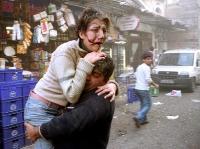Suicide bomber carried out attack using methods of Kurdish rebel group,six people killed
A suicide bomber carried out the attack that killed six people and injured dozens in Turkey's capital, using methods similar to those of a Kurdish rebel group.

Ankara Gov. Kemal Onal identified the suicide attacker as Guven Akkus, a 28-year-old man who had spent two years in prison for hanging illegal posters and resisting police during May Day demonstrations, which often turn violent in Turkey.
Onal did not say what kind of posters they were or if Akkus was affiliated with the separatist Kurdish rebel group, the Kurdistan Workers Party, or PKK.
"The type of the explosives and equipment used is similar to those used by the separatist group," Onal said. "It is highly likely that the explosives used were A-4 plastic explosives."
Onal said Akkus blew himself up Tuesday at a bus stop in front of a busy shopping mall, and the nature of his injuries made clear he was not a victim. He said forensic teams identified the attacker through two fingers found at the site, and that the teams collected three trucks full of evidence.
Police distributed photos of Akkus, a slender man with short hair and large glasses. Police in Istanbul questioned Akkus' brother and sister for two hours, the private Dogan news agency reported.
Prime Minister Recep Tayyip Erdogan did not directly accuse the PKK of involvement, but he suggested that the rebel group was suspected.
"We were worried that the terrorist organization could carry out such attacks in major cities," Erdogan said, referring to the PKK. "This is treason. This is a cruel act by those who think they can create an atmosphere of tension and fear."
Foreign Minister Abdullah Gul convened an emergency meeting Wednesday to discuss new security measures. Police launched a nationwide security sweep and said they detained a man and a woman possessing 5 kilograms (11 pounds) of explosives in the southern city of Adana.
Gov. Ilhan Atis of Adana said the woman could have been planning to stage a suicide attack based on the initial interrogation of the suspects, whose affiliation was not immediately clear.
The attack came at the start of the tourist season, and the injured included eight Pakistanis in Ankara for a weeklong international defense industry fair about 20 kilometers (12 miles) from the shopping mall.
Authorities earlier said 102 people were hurt, but the governor put the final injury toll at 91. Some of the injured were counted twice by mistake, the governor's office said.
Earlier this year, Kurdish militants warned that tourists could be their next "targets." The guerrillas allege Turkey is using lucrative tourism revenues to finance military operations against the separatists.
In August, a hard-line Kurdish group claimed responsibility for a bus bombing in the Mediterranean resort of Marmaris that injured 20 people, including 10 Britons.
But Islamic militants have also carried out bombings in Turkey. In 2003, al-Qaida-linked suicide truck bombers in Istanbul attacked two synagogues, the British Consulate and a British bank, killing 58 people.
"Who feeds terrorist groups? Who's behind them? That's what we need to look at," said Gen. Yasar Buyukanit, Turkey's military chief.
Buyukanit has accused Europe of not doing enough to prevent sympathizers from providing aid to the Kurdish rebel group PKK, deemed a terrorist organization by the United States and the European Union.
NATO Secretary General Jaap de Hoop Scheffer condemned the attack, and Germany, which currently holds the European Union presidency, extended sympathies to the victims' families and said the perpetrators must be brought to justice.
The Turkish military says Kurdish rebels are smuggling hundreds of pounds of plastic explosives into the country from neighboring Iraq, where the guerrillas have been based for decades.
There is growing impatience in Turkey over how to deal with Kurdish rebels, and the government has not ruled out military operations aimed at their bases in northern Iraq. The United States opposes Turkish military action in Iraq, fearing it would complicate U.S. efforts to restore stability there.
The blast happened about 2.5 kilometers (1.5 miles) from the Anatolian Museum of Civilizations where Buyukanit was scheduled to host a reception for visitors of the defense fair less than two hours later. The reception went ahead as planned.
The museum is one of many in the Ulus neighborhood, one of the oldest parts of Ankara and home to the old parliament house. The shopping mall, called Anafartalar, sells mostly clothes and textiles.
Subscribe to Pravda.Ru Telegram channel, Facebook, RSS!


